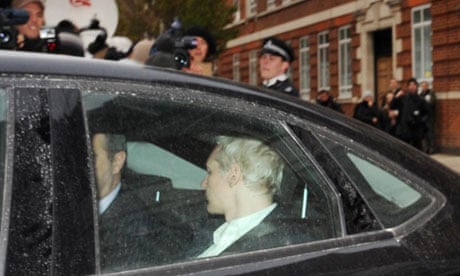WikiLeaks founder Julian Assange was remanded in custody today after appearing in court on an extradition warrant.
The 39-year-old Australian, who is wanted in Sweden over allegations he sexually assaulted two women, was refused bail on the grounds there was a risk he would fail to surrender.
Before a packed court No 1 at Westminster magistrates court, District Judge Howard Riddle said Assange was to be remanded in custody until a further hearing on December 14.
The ruling came despite Jemima Khan, film director Ken Loach and veteran journalist John Pilger standing up in court to offer to act at surety for Assange.
But the judge concluded that because of the "serious" nature of the allegations against Assange, his "comparatively weak community ties" in the UK, and that it was believed he had the financial means and the ability to abscond, there was a substantial risk he would fail to surrender.
"This case is not, on the face of it, about WikiLeaks. It is an allegation in another European country of serious sexual offences alleged to have occurred on three separate occasions and involving two separate victims," he said.
Assange appeared in the glass-panelled dock in a courtroom crammed with up to 50 British and international journalists. There was standing room only in the public gallery as he spoke to confirm his name and date of birth.
But there was confusion when he initially refused to give an address, stating only a post office box number, which was unacceptable to the court. Eventually, after discussions with his lawyer, he gave an address in Parkfield, Victoria, Australia.
Gemma Lindfield, representing the Swedish authorities, told the court he was wanted in connection with four allegations.
The first complainant, a Miss A, said she was the victim of "unlawful coercion" on the night of 14 August in Stockholm. The court heard Assange was alleged to have "forcefully" held her arms and used his bodyweight to hold her down. The second charge alleged he "sexually molested" her by having sex without using a condom, when it was her "express wish" that one should be used.
A third charge claimed Assange "deliberately molested" Miss A on 18 August.
A fourth charge, relating to a Miss W, alleged that on 17 August, he "improperly exploited" the fact she was asleep to have sex with her without a condom.
Lindfield argued Assange should be refused bail because of his "nomadic lifestyle", citing reports in the media he intended to seek asylum in Switzerland, he had access to money from donors and a network of international contacts, and because as an Australian he was only entitled to stay in the UK for a limited time.
He had also refused to have his fingerprints taken or give a DNA sample on arrest. She also argued it was for his own protection as "any number of unstable persons could take it upon themselves to cause him serious harm".
"This is someone for whom, simply put, no conditions, even the most stringent conditions that could be imposed, would ensure he would surrender to the jurisdiction of this court."
Well-known figures attended court to stake their reputation by offering sureties totalling at least £180,000.
Khan, former wife of the Pakistan cricketer Imran Khan and sister of the Tory MP Zac Goldsmith, told the court that although she did not personally know Assange she was prepared to offer £20,000, or more if needed.
Pilger said that he did know Assange and had "a very high regard for him". He was prepared to offer £20,000, he said, describing the proceedings in Sweden as "absurd" and saying it would be "a travesty" if Assange had to "go within that Swedish system".
Loach , who also offered £20,000, said he did not know Assange, but added: "I think the work he has done has been a public service, I think we are entitled to know the dealings of those that govern us."
Assange's solicitor, John Jones, said the case was not about WikiLeaks but was a simple accusation case with the right to bail. Assange was of good character, he had voluntarily surrendered to police, and he had a UK address where he was able to stay, he added. Assange, who had stayed at London's Frontline Club for two months, had been staying at this new address for the past three weeks, Jones said.
He had refused to have his fingerprints taken or volunteer a DNA sample on legal advice, said Jones. He said Assange did not have access to vast sums of money.
He also said Assange had left Sweden after seeking permission, had made offers to be interviewed either at the Swedish embassy in London, at a police station or via video conferencing.
The case had been dropped by one Swedish prosecutor, only to be reopened by another, he told the court.
